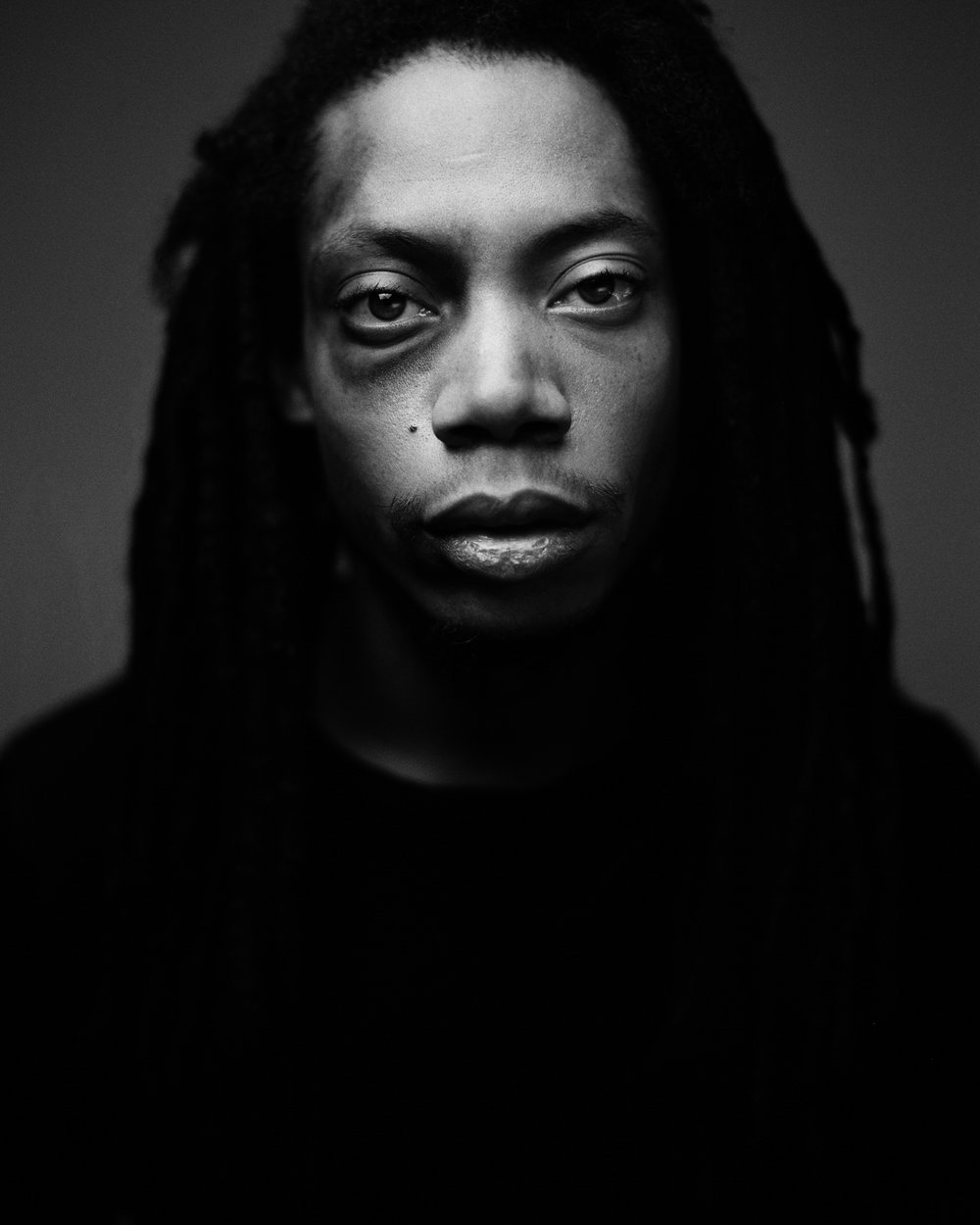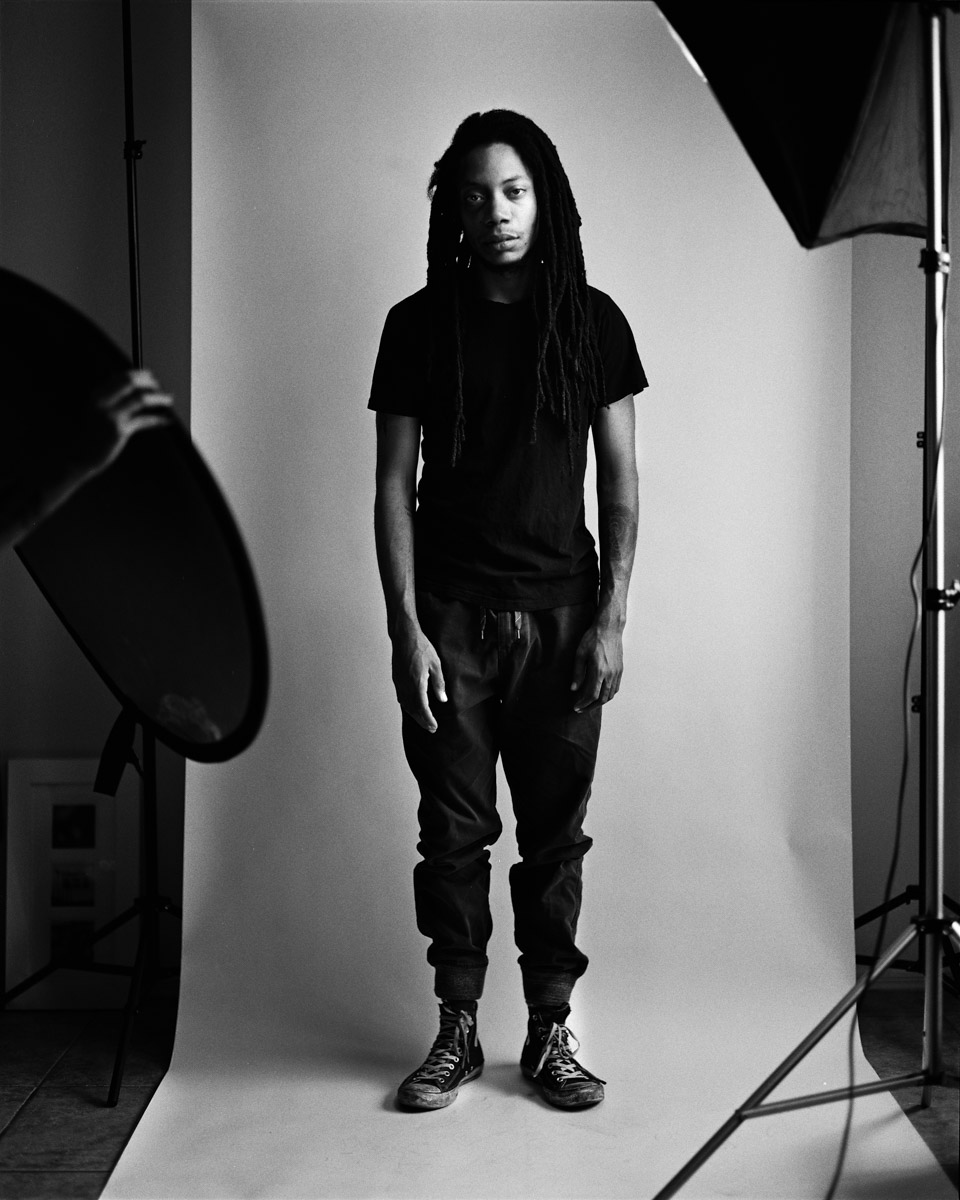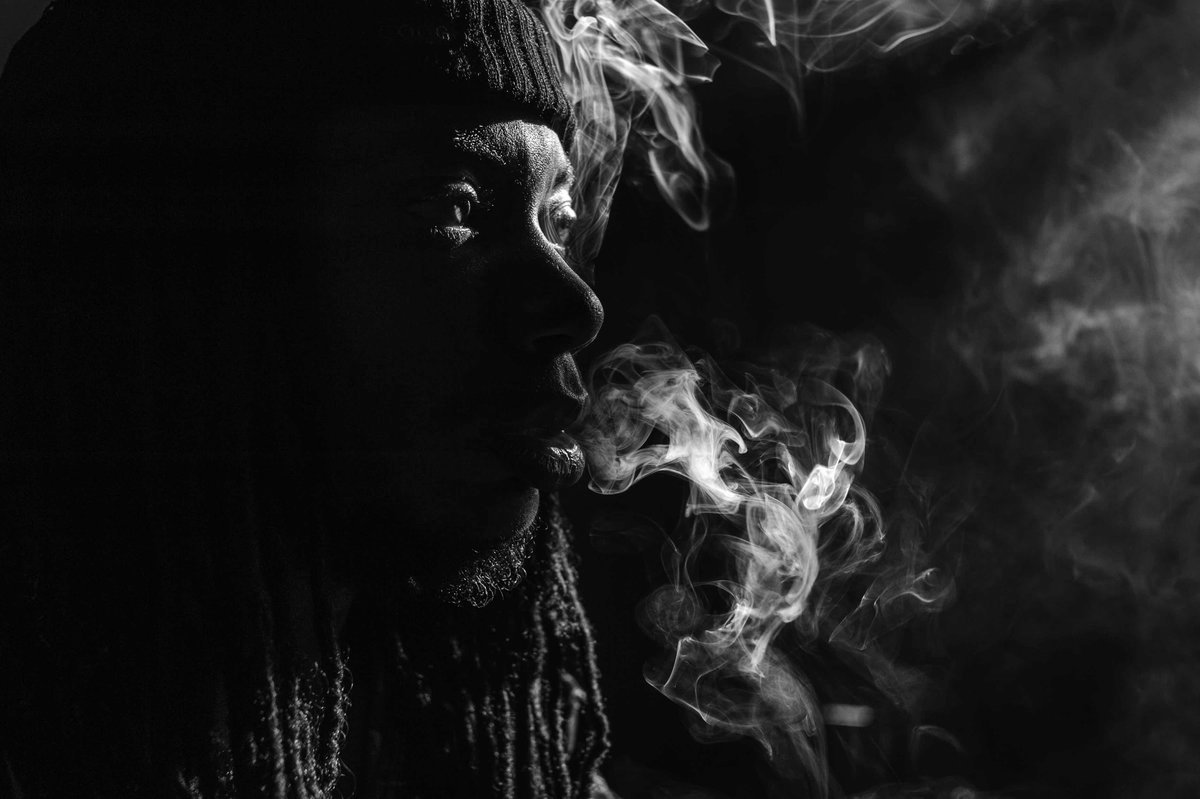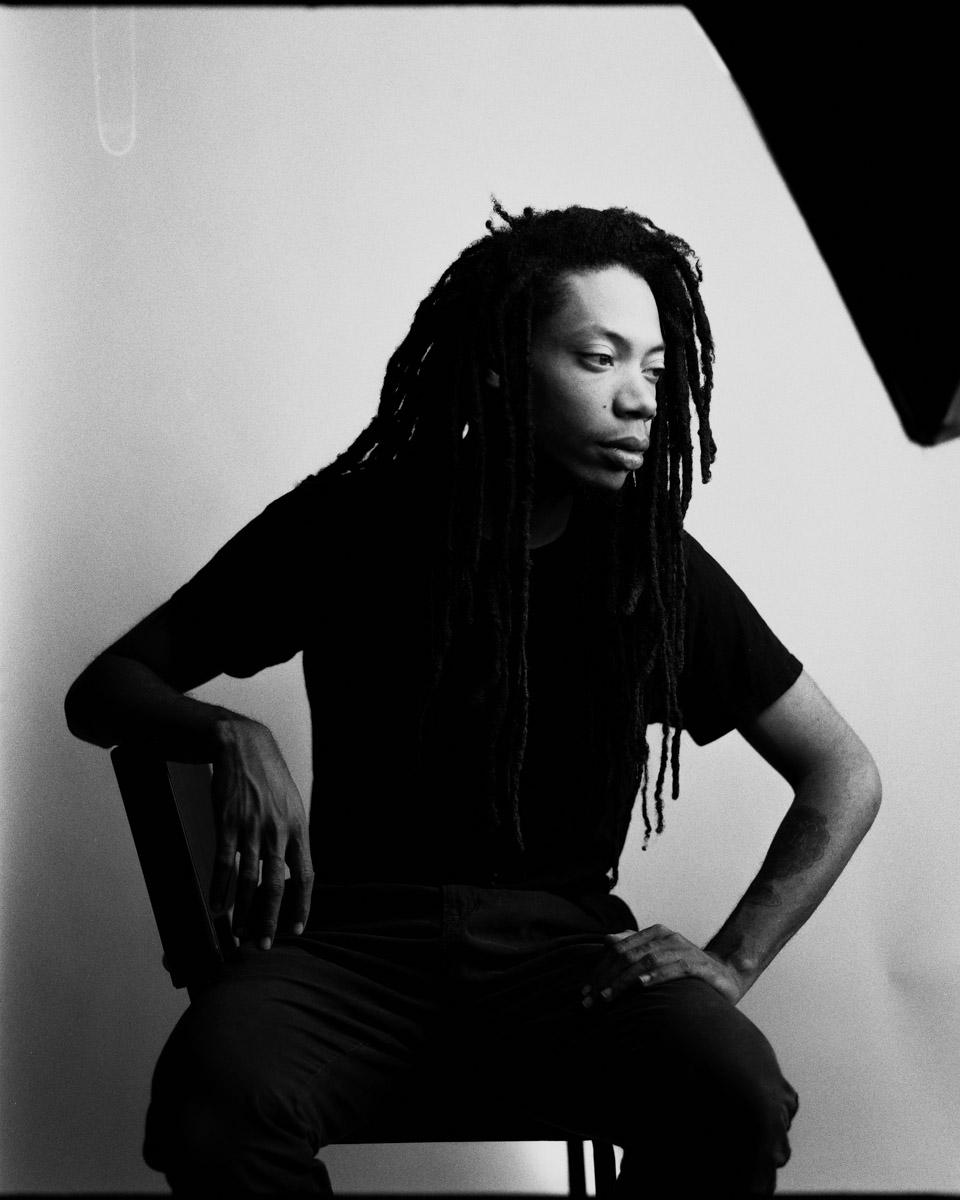Photography TAYLOR NOEL
As if last year’s The Boy Who Spoke to the Wind LP wasn’t enough of a leap forward for Lando Chill, the Chicago-born, LA-based MC turns this week’s Black Ego LP into a treatise on where we’ve been, where we’re at now, and how far we still have to go. Toss the left-field loops of The Lasso into the mix, along with a stellar guest list, and there’s a lot to unpack here.
Listen and learn below, as Lando breaks his magnum opus down, track by dizzying track, the day before its official release on Mello Music Group…..
“Ego Vanish” is an introduction to the inner struggle of how dualistic our souls truly are; exploring our capability to realize where and when our hubris clouds judgement and influences perception of self worth within the hierarchy of a society built on entertainment and wealth. There is no unilateral black experience, yet the dichotomy of black suppression in juxtaposition with the presence of black pride has reinforced this cyclical narrative that has prevailed since we were sold into chattel bondage. The ownership of what we see as blackness and its culture are not often held fast by actual black and brown peoples, but controlled by anti-black ideology burned into our psyche by centuries of being the “other” from those who profit off of the black experience.
“CLYYPED”
This shit is a banger. I felt a real obligation to break every box it seems people want to put me in, whether it was switching up my cadence and flow, finally having a starring feature on a track of mine (shout out to MotorKam; dat nigga nice), or just creating a kush track that bumps. A lot of my previous music you can’t dance to, but Lasso and I made a conscious effort to bring some bounce to Black Ego. This track is giving y’all a REAL snapshot of where I was at the time I wrote the song, so listen up.
“FACTS”
We delve into the deep end on “Facts,” touching on the prevalence of an uninhibited drinking culture, our ignorance about climate change, the male privilege I and many men so readily enjoy at the expense of women, and the police state that oppresses the marginalized and voiceless. “Speaking your truth, that’s gon take you higher” is a part of the ego we as the “other” need to embrace and embody. It is the only way we as a people—regardless of affiliation—can stem the erasure of culture and the rewriting of history.
“PESO”
Lasso and I set out to create a soundscape—a canvas for our Southwest border influence and Midwest origins, nestled between the experience of living as a person of color in a police state and the caution one must inherit in order to feel safe in a country that has yet to fully accept nor understand equality. The hood is as much the “frontline” as the border and reservations, as they all have been militarized against and oppressed by our government through legislation, perception, and abhorrent action. Quelle Chris and Rey from Ojalá Systems round out the narrative, creating a kaleidoscope of wisdom and wariness that precedes what it means to be a person of color battered by the wage gap within the police state in which we reside.
“DAH VAPOR”
Black culture is popular culture, with various racial caricatures and appropriated stereotypes abound within every facet of our entertainment. There is a pure difference between reverence and obsession; on “Dah Vapor” (produced by Lasso and featuring Swansuit), we delve deep into that paradigm. We as a consumer base have varying levels of societal awareness in regards to the appropriation of black, brown and queer culture, and waver between accepting it as a causality of our progression toward representation and true equality or as an aspect of a colorblind or supremacist ideology, rearing itself through the whitewashing of our history and the degradation of civil rights.
In “Dah Vapor,” the exploration beyond the surface level of appropriation searches for authenticity (or lack thereof) and the commodification of what starts as cultural and regional distinction but morphs into either a commodifiable flashpoint or misconceptions built from ignorance. We, as a people, are an untapped potential—a spout controlled by gatekeepers who search for the flavor of the month, and by the shackles surrounding our own perception of self.

“FAUNA”
As with almost every song on Black Ego, there’s an undertone of black veracity and frustration juxtaposed against sonically groovy chords and a catchy hook. “Fauna” emotes a Prince-like vibe that transports the listener within a specific mind state, one that allows the theme of black ownership within the entertainment industry and the stresses that occur under the current climate of what hip-hop culture is today to be more than palpable, but relatable.
Originality is something we as musicians pride ourselves on, but unfortunately the mainstream consumer base has a hard time telling the difference, lacking the will power to do the leg work when it comes to the history of this genre and in result, paving the way for the erasure of many people’s contributions and milestones. The “Black Ego” is a representation, physically and metaphorically, of the originality, authenticity and ingenuity that is being commodified and packaged with the lack of ownership and constant appropriation being the backdrop of our struggle.
Struggle taste better brown as a white hobby
Sound is a bank lobby bound by the trends
Black skills make it bend…
Marijuana is, and has been, the temporary antidote for the black and brown mind when it comes to the inherent stresses of a Eurocentric, male-dominated world, yet has only recently become decriminalized within a few states. The spectrum of thought surrounding marijuana has shifted from a drug used by people of color and the poor to a medicinal substance-turned-multi-billion-dollar industry that has left incarcerated pioneers and users in the dust, mirroring the way the public perception of hip-hop has shifted within the last decade. Just like marijuana, it had to become marketable and commodifiable, and for that to occur, there needed to be white dollars invested, and white artists at the forefront, to create a palpable enough version of this genre.
This demographic shift of audience has been a boon to those gatekeepers who control what sells and what doesn’t, but to many underground, POC, women, and queer artists, it has done nothing but widen the gap between access and exposure and the mainstream, as well as threaten the cultural integrity of our artform. The juxtaposition of music and marijuana in this song and in subsequent art is no accident, nor should either lose its integrity and originality to the dollar bill; especially whilst its black and brown creators, ancestors, and entrepreneurs are left to battle old misconceptions that continue to permeate mainstream entertainment and those who police it.
“CESS”
As we get deeper into the ego—exploring black pain, joy and pride—the conversation becomes a declaration. A challenge to those who underestimate the veracity of which me and mine will fight for our own, because the highway to true equality is paved with the bodies of many martyrs who came before growing up black. This was something we were prepared to face.
Is ignorance truly bliss or does that statement only work for those who can afford that said ignorance? Either way, we all fade into the ether; hence why you hear the repeating “floating” theme present across our many projects. Like smoke in the wind from the cess, they burn. In this instance—and in various instances throughout the history of our society—the “cess” I speak about being burned is our culture and the ownership of a blackness defined by us, not the dollar bill.

I just want your kool-aide
I just want that lovin’
“KOOLAIDE”
This song, on its surface, can be interpreted as a track about appropriation. And rightfully so. But let’s go deeper. The ownership of blackness, at its core, isn’t just the control of voice and mind, but of body as well. Us as black men and women seen only as the stereotype you’ve been taught, peering through a lens coined from disdain that reduces us and our experiences to needlehole proportions until all you see is either a black body to fuck or a black mind into undermine. Black women and their bodies, in particular, have been subjected to the full weight of exploitation and degradation; forced sterilization and child breeding on plantations, to name only a few. These are things we aren’t taught, and without knowledge of the past, how are we supposed to change the future?
“ALL MY LIFE”
I’ve felt uneasy all of my life until I found this artistic medium; but the uneasiness only grows when said medium is filled with bullshit. This ain’t that bullshit. Shout out to Psypiritual, Ojala Systems og.
“BUSS IT TIL IT FIT”
You tell me what you think this song is about and I’ll let you know if you’re right.
“FREEPACK”
This is one of my favorite tracks on the record. Hands down, the production… that goddamn baseline and guitar plucks. Timeless shit. Hopefully ya’ll catch that Robin Williams reference; homie was one of my idols. Miss that man.

“FROM THE HIP”
Plainly enough, this is one of the most honest songs I have ever written. Complacency is the death of progress, as is accepting the status quo and anyone who impeds the trajectory we are on, friend or otherwise, is deemed a liability. This goes out to the non-POC/POC gatekeepers that build playlists filled with caricatures of blackness while lending to the erasure of women of color and queer folx within this cultural oil well called hip-hop.
This goes out to labels who feel as though we as individuals are replaceable in ways that assembly line pieces can be fashioned and installed within the time it takes to end someone’s career before it ever began. This goes out to the “influencers” and agencies, who shift the power dynamic of the entertainment industry that values follower counts more than actual talent or artistic progress, then lacks the tact to admit when wrong as their creation crumbles under expectations they were never equipped to meet.
Shoot from the hip
This music’ll dip like ‘bacco spit
Pound every round I load the clip
Found our own sound on some Bowie shit
“From the Hip” is a warning shot, far beyond what we see as the instant definition: “seen as doing something without planning or consideration, or aiming wildly at anything or anyone.” It is the exact opposite in my opinion, with the use of intuition, HISTORY, and forethought to calculate when and where to strike, but with a callousness and brute honesty akin to the best shots from the Old West. The appearance of improvisation is what you want to see, but in reality what and who we are as a people, a culture; commodified and catalogued as if our bodies and art are kept in the Smithsonian; under the designations of either queer, POC, women, disabled or handicapped; is something beyond the shortsighted comprehension of those who want to be, sell and buy black.
They actually don’t WANT to be BLACK or UNDERSTAND the spectrum of what it means to be of the culture, not just IN the culture. Now the dichotomy, as a POC, lies within pimpin’ the game to change it from the ground up whilst lending credence to any vulture culture that hears your music and sees an opportunity to commodify another black body as a way to maintain authenticity. It’s something I feel many folk on this earth have felt, in regards to whatever artistic or cultural space they occupy in juxtaposition to those who commodify that said place. When do we build on our own? What is authenticity? How do we change the status quo of what hip-hop is today? Is our art as respected or revered or just another notch in a belt made of catalogues? I guess that’s for us, as foot soldiers in this war of attrition, to determine, and then act accordingly. Me? I shoot from the hip.
“LOVE COLD”
Probably one of the most personal songs I’ve ever written. I think being black in America, we tend to get jaded. How could a lot of us not be? But there’s something about black folk, and blackness in general, that embodies a form of forgiveness that allows us to try and see the good in people before we see the bad. Of course there will always be some form of prejudice, but there’s something about the soul that allows us to unlock the door many of us have closed in front of our true selves.
Being black, to you, is probably seen as a burden. Sometimes it takes a while, but to many if not all of us, being black is beautiful. Every aspect, the joy, the rage, the pain, the love, the history. It is what made us, and it is what will save us. And by us, I mean the collective us. The black ego is the world’s ego. You just gotta look past the surface.


